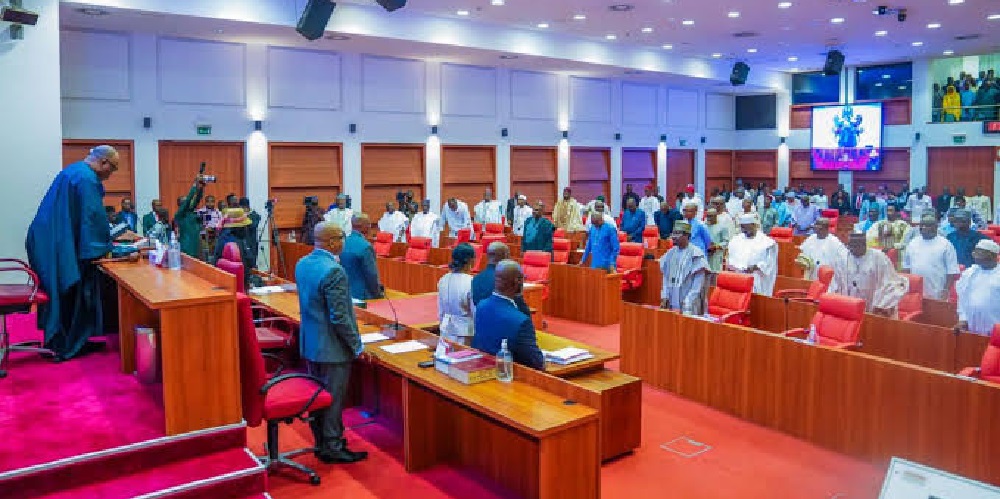Senators from Nigeria’s South-East region have decided to engage in further consultations with their state governments, constituents, and other relevant stakeholders before taking a final stance on the contentious tax reform bills currently under consideration in the National Assembly.
The decision, made under the aegis of the South-East Senators’ Forum, reflects the lawmakers’ desire to ensure that their position on the reform bills aligns with the collective interests and concerns of the people they represent. According to Senator Eyinnaya Abaribe, the leader of the caucus, the senators are committed to ensuring that the views of their constituents are considered before any final decisions are made.
Abaribe shared these details during a press briefing on Monday following a closed-door meeting of the South-East Senators at the National Assembly in Abuja. The bills in question—comprising the Nigeria Tax Bill 2024, the Tax Administration Bill, the Nigeria Revenue Service Establishment Bill, and the Joint Revenue Board Establishment Bill—were submitted to the National Assembly by President Bola Tinubu on October 3, 2024. These pieces of legislation are part of a broader effort to overhaul Nigeria’s tax system, with the goal of enhancing revenue generation and addressing inefficiencies in the country’s tax administration.
However, the proposed reforms have generated significant controversy, with opposition to the bills taking on ethnic and sectional tones. Critics argue that the reforms could disproportionately affect certain regions of the country, leading to fears of economic and social imbalances. In light of these concerns, the Senate established a committee to engage with a federal government delegation, led by the Minister of Justice and Attorney General of the Federation, Lateef Fagbemi, to address the criticisms and clarify the provisions of the bills. Unfortunately, the scheduled meeting of the committee last Thursday was postponed due to Fagbemi’s absence.
Commitment to Wider Consultations
While Senator Abaribe and other South-East lawmakers expressed general support for the tax reforms, they underscored the importance of conducting wider consultations to address the specific concerns of the South-East zone. Abaribe emphasized that although the senators were not opposed to the bills, it was crucial to consult with their constituents across the 15 senatorial districts in the region, as well as with state governments and other key stakeholders.
“We are not against the Tax Reform Bills currently before the National Assembly,” Abaribe stated. “However, we believe that broader consultations are necessary to ensure that the bills, when passed, are beneficial and equitable for all Nigerians, including our people in the South-East.”
He further explained that, despite their general support, the South-East senators wanted to ensure that the tax reform framework was equitable and took into account the region’s unique challenges and circumstances. “We have read through the bills, and we are prepared to share our understanding of the reforms with stakeholders in our zone,” he said. “Our objective is to ensure that the final outcome reflects the diverse needs of the country and doesn’t inadvertently marginalize any region.”
Abaribe’s comments underscore the senators’ commitment to making informed decisions that reflect the best interests of their constituents while ensuring that the tax reforms achieve the overarching goal of improving Nigeria’s fiscal health.
Support from Other Regions
The South-East senators’ position on the tax reforms contrasts with the stance taken by senators from the South-South region, who expressed full support for the reforms last Thursday. Senators from the South-South emphasized that, despite the criticisms, the reforms were necessary to strengthen the country’s revenue base and promote long-term economic stability. They also urged Nigerians to avoid making the debate about ethnicity or regional interests, stressing that the focus should be on the national interest.
The South-South senators also cautioned those opposing the reforms to refrain from framing their criticisms in ethnic, regional, or tribal terms. “The tax reform bills are intended to benefit all Nigerians,” they said, “and the opposition should be constructive, not driven by sectional or tribal sentiments.”
Next Steps and Future Outlook
As the debate continues, the South-East senators are expected to consult with various stakeholders, including local government officials, business leaders, and civil society groups, to gauge their opinions on the proposed reforms. The outcome of these consultations will likely influence the senators’ final position when the bills return for further debate in the National Assembly.
In the coming days, as discussions around the bills intensify, the role of the South-East senators will be critical in shaping the final version of the reforms. Their commitment to engaging with their constituents and other stakeholders highlights the importance of ensuring that any major policy changes reflect the interests and needs of the diverse regions of Nigeria.
Ultimately, while the tax reforms hold the potential to address long-standing fiscal challenges in the country, their success will depend on how well they are tailored to accommodate the diverse interests of Nigeria’s varied regions, and whether the necessary consultations are conducted to ensure a fair and balanced outcome for all.

